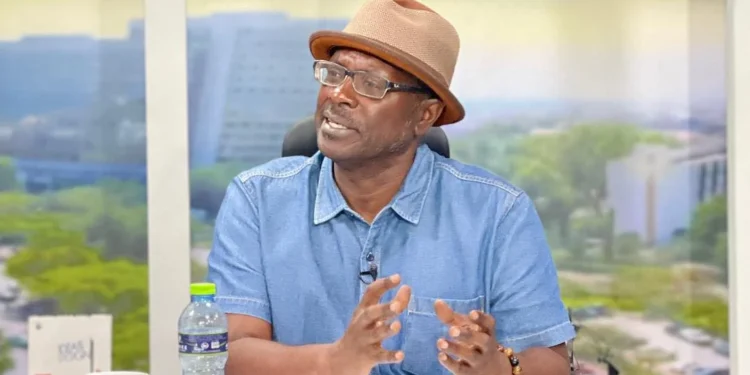It is safe to say that diplomacy has taken a backseat to military might in the Middle East, where the roar of missiles often drowns out the voices advocating for peaceful resolution.
The recent escalation in hostilities underscores this reality as in direct response to barrage of ballistic missiles launched against it earlier this month, Israel, on October 26, 2024, executed targeted strikes against Iranian military installations—a move that reverberates far beyond the immediate conflict.
This act of defiance serves as a stark reminder of the volatile dynamics at play in the region, where power, perception, and preemptive strikes intertwine in a dangerous dance. A high-stakes game of missiles, where the players are more determined than ever to assert their dominance.
Speaking with the Vaultz News, Dr. Victor Kofi Afetorlom Doke, a Research Fellow at the Kofi Annan International Peacekeeping Training Centre, provided crucial insights into the motivation behind Israel’s actions.
He emphasized that the strikes are not merely retaliatory; they are a calculated message to both Iran and the international community. “They just want to say, ‘we are in control’,” he asserted, framing Israel’s military strategy as a demonstration of dominance in a region rife with tension.
Dr. Doke argued that this show of strength is meant to unequivocally communicate Israel’s readiness for confrontation. “Israel wants to categorically state that when it comes to confrontations, they have the arsenals,” he explained.
Israel’s underlying message, he said, was clear: just as Iran has launched missiles at Israel, the latter is fully capable of striking back with precision.
He added that Israel aims to assert its authority over the region, signaling to allies and adversaries alike that Israel remains a formidable force in the Middle East.
“Israel wants to tell the international community that they dominate in that region in the Middle East. And when it comes to fighting other armed groups that have been alleged to have affiliations with Iran or Palestine, they are going to have that mandate irrespective of whether the UNSC gives it or which superpowers gives it, they would go all out and fight for their interests and safeguard their citizens.”
Dr. Victor Kofi Afetorlom Doke
Also, Dr. Doke opined that Iran has “learnt its lesson.”
He said that Iran has noticed that a confrontation with Israel at this critical time will not be comfortable. “So I’m hoping it would not retaliate because to lose military operation installations is expensive,” he added.
Nonetheless, he underscored that this doesn’t mean that Iran’s military system has been weakened.
“When you attack and then you receive a retaliation, you go back. Your Commanders will have to meet and then assess the damage and then project. In case there’s another attack, where will it be? And how much cost or consequences would that be?
“I think they’ve done that, and then realized that they can’t afford to receive another attack which will go against them severely. The army is not weakened as a weak, no, but you count your losses and then you analyze if it is worth it. And then you make a decision. So I think that’s what they would do.”
Dr. Victor Kofi Afetorlom Doke
For weeks the US had warned Israel publicly against hitting oil infrastructure or sites linked to Iran’s nuclear programme over fears of sparking a broader regional conflagration. Ultimately, Israel struck military targets only, leading some Analysts to say that it is a diplomatic success for Washington.
Commenting on this, Dr. Doke noted that US and Israel have bilateral relations where America supplies Israel with weapons, stating that when it comes to war, “with regards to America, it is a gain. For Israel, it’s also a gain so you’re talking about a win-win here.”
He opined that there can be some kind of agreement when it comes to areas to target, “but America cannot dictate for Israel.”
He pointed out that despite American calls for a ceasefire, Israel has continued its bombardment of Gaza, illustrating that Israel does not feel compelled to halt its actions based on U.S. pressure.
Moreover, he noted that the ongoing conflict is economically advantageous for the United States, leading them to tread carefully in their proposals.
“Each and every day the war is fought, they make millions of dollars by producing weapons for Israel. That is the case. So, for them to tell Israel to stop it outright, it won’t happen but then they would propose solutions such as cease fire, humanitarian assistance and all of that.”
Dr. Victor Kofi Afetorlom Doke
A Clearer Path Toward Reaching An Agreement
Meanwhile, Gaza ceasefire talks, stalled for months, have restarted in Doha, following Israel’s assassination of Hamas leader, Yahya Sinwar.
Dr. Doke observed that with Sinwar out of the way, there will surely be some sort of agreement when it comes to the ceasefire and humanitarian assistance. “So, hopefully, we are all looking up to that agreement being finalized and then agreed upon,” he expressed.
He further noted that Israel’s primary concern remains focused on the armed groups operating in Lebanon and Gaza, particularly their Commanders.
He added that if Israel notices that any other Commander that has been installed with regards to an armed group that Israel deems a terrorist group or Israel’s enemy, “they would retaliate again and we’ve seen it over and over again.”
This conflict, according to the Peace Expert, is just a testament of how Israel will stop at nothing to achieve its set target, which is “eliminating every leader of armed groups” that threaten its security. “With Sinwar’s death, let’s hope and pray that this is not just a rhetoric, but then something will come out of it,” he said.
As the dust settles from the latest flare-up in the Middle East, it remains to be seen if diplomacy can rise to the occasion, or military strategies will continue to dictate the course of peace.
READ ALSO: Government Declares Curfew in Bawku Amid Rising Tensions























